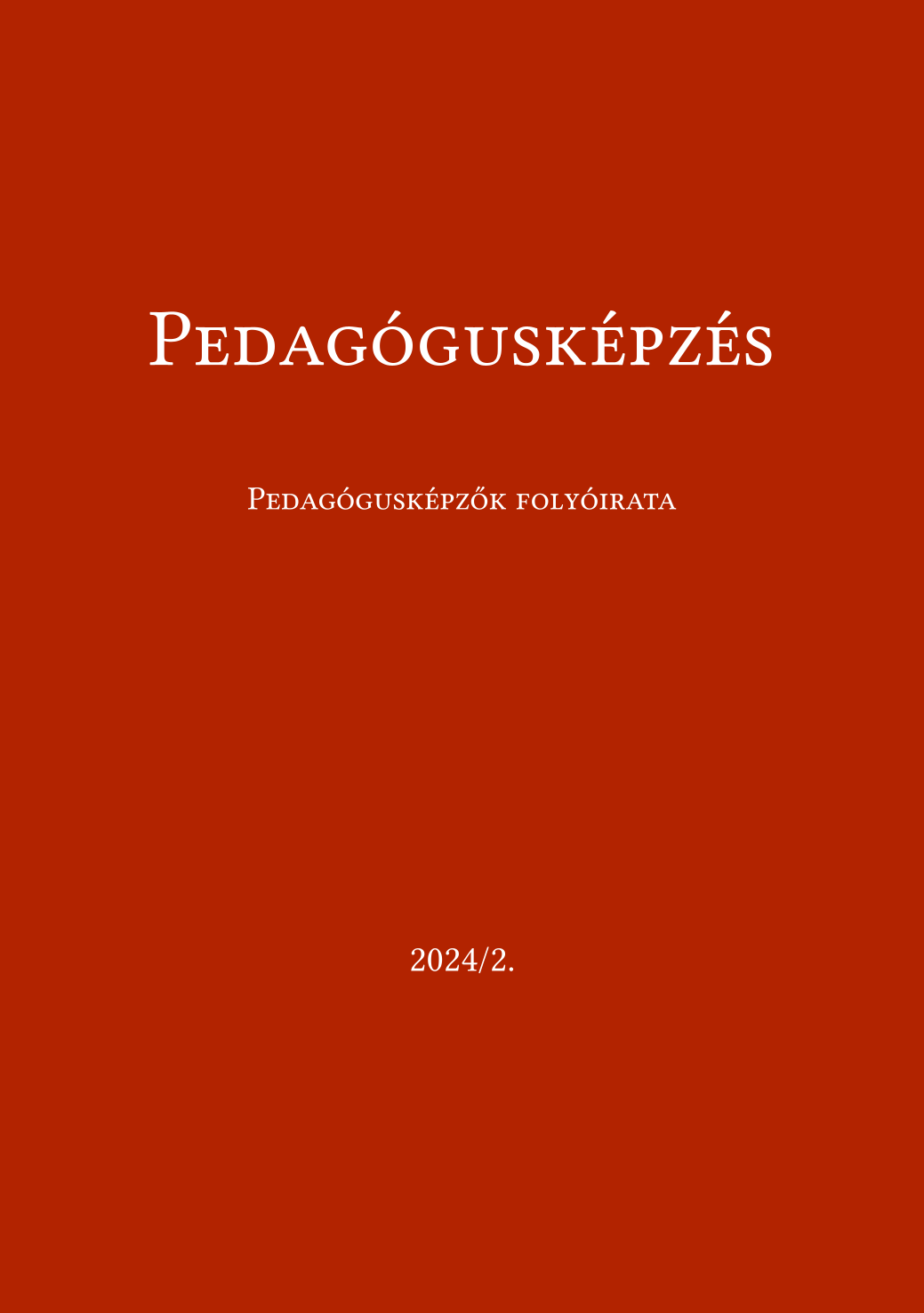Some aspects to consider to build teachers' job satisfaction: A comparative study of Uzbek and Hungarian teacher appraisals
DOI:
https://doi.org/10.37205/TEL-hun.2024.2.02Keywords:
teacher career models, teacher assessment, salary schemesAbstract
The initiative of the Hungarian government to introduce a new teacher appraisal system within the whole-scale teacher assessment made us review the operational teacher career models and teacher appraisal frameworks linked to salary schemes in the world and compare the planned Hungarian model with the Uzbek teacher career model and teacher appraisal framework. The comparison includes the evolution of appraisals, their procedures, criteria, and methodology.
Our study proposes some ideas for decision-makers to consider when introducing or modifying teacher assessment frameworks so that they can better contribute to teachers' well-being and to improving the quality of work in education.
References
Ball, S. (1994). Education Reform: a critical and post-structural approach. Open University Press.
Bascia, N. & Rottmann, C. (2011). What's so important about teachers' working conditions? The fatal flow in North American educational reform. Journal of Education Policy, 26(6), 787–802. https://doi.org/10.1080/02680939.2010.543156
Bottery, M. (1996). The challenge to professionals from the new public management: implications for the teaching profession. Oxford Review of Education, 22, 179–197. https://doi.org/10.1080/0305498960220206
Braun, H. (2005). Using Student Progress to Evaluate Teachers: A Primer on Value-Added Models. Edu-cational Teaching Service.
Cazes, S., Hijzen, A. & Saint Martin, S. (2015). Measuring and Assessing Job Quality: The OECD Social, Employment and Migration Working Papers, No. 174. OECD Publishing.
Cochran-Smith, M. & Lytle, S. L. (1999). Relationships of Knowledge and Practice: Teacher Learning in Communities. Review of Research in Education, 24(1), 249–305. https://doi.org/10.3102/0091732X024001249
Crehan, L. (2016). Exploring the impact of career models on teacher motivation. IIEP-UNESCO.
Falus, I. (Ed.) (2011). Tanári pályaalkalmasság – kompetenciák – sztenderdek. Nemzetközi áttekintés. Eszterházy Károly Főiskola.
Fullan, M. (2001). Leading in a culture of change. Jossey-Bass.
Gewirtz, S. (1997). Post-welfarism and the reconstruction of teachers' work In the UK. Journal of Edu-cation Policy, 12, 217–232.
https://doi.org/10.1080/0268093970120402
Gomendio, M. (2017). Empowering and Enabling teachers to Improve Equity and Outcomes for All. International Summit on the Teaching Profession. OECD Publishing. https://doi.org/10.1787/9789264273238-en
Hanushek, E. (2007). The single salary schedule and other issues of teacher pay. Peabody Journal of Education, 82(4), 574–586. https://doi.org/10.1080/01619560701602975
Hargreaves, A. (2000). Four Ages of Professionalism and Professional Learning. Teachers and Teaching: History and Practice, 6, 151–182. https://doi.org/10.1080/713698714
Hargreaves, A., & Fullan, M. (2012). Professional Capital: Transforming Teaching in Every School. Teachers College Press.
Hattie, J. (2009). Visible learning: A synthesis of over 800 meta-analyses relating to achievement. Routledge.
Isoré, M. (2009). Teacher Evaluation: Current Practices in OECD Countries and Literature Review. OECD Education Working papers, No. 23. OECD Publishing.
Kane, T. & Staiger, D. (2012). Gathering feedback for teaching. Combining high-quality observations with students surveys and achievement gains. MET Project Research Paper. The Bill & Melinda Gates Fundation.
Kotschy, B. (Ed.) (2011). A pedagógussá válás és a szakmai fejlődés sztenderdjei. Eszterházy Károly Főiskola.
Marshall, K. (2005). “It's Time to Rethink Teacher Supervision and Evaluation”, Phi Delta Kappan, 86(10), 727–735. https://doi.org/10.1177/003172170508601004
Mead, S., Rotherham, A. & Brown, R. (2012). The Hangover: Thinking About the Unintended Conse-quences of the Nation's Teacher Evaluation Binge, Teacher Quality 2.0. American Enterprise Insti-tute, Special Report 2, September.
Mourshed, M., Barber, M. & Chijioke, C. (2010). How the World's Most Improved School Systems Keep Getting Better. McKinsey & Company. http://iel.immix.ca/storage/6/1304014879/McKinsey_Full_Report_Nov_2010%282%29.pdf
Odilov, A. (2023). Teacher Career Structure Reforms in Uzbekistan: The current Challenges and Lessons Learned from Top-performing Education Systems. Science and Innovation, 2(6), 30–47.
OECD (2005). Teachers Matter: Attracting, Developing and Retaining Effective Teachers. OECD Pub-lishing. https://doi.org/10.1787/9789264018044-en
OECD (2009). Creating Effective Teaching and Learning Environments: First Results from TALIS. OECD Publishing. https://doi.org/10.1787/9789264068780-en
OECD (2013). Synergies for Better Learning: An International Perspective on Evaluation and Assess-ment in Education. OECD Publishing. https://doi.org/10.1787/9789264190658-en
OECD (2020). TALIS 2018 Results (Volume II):Teachers and School Leaders as Valued Professionals. TALIS. OECD Publishing. https://doi.org/10.1787/19cf08df-en
Ozga, J. (1995). Deskilling a profession, In Busher, H. & Saran, R. (Eds.), Managing Teachers as Profes-sionals in Schools. Kogan Page.
Papay, J. (2012). Refocusing the debate: Assessing the purposes and tools of teacher evaluation. Har-ward Educational Review, 2(1), 123–141. https://doi.org/10.17763/haer.82.1.v40p0833345w6384
Santiago, P. & Benavides, F. (2009). Teacher Evaluation: A Conceptual Framework and Examples of Country Practices. OECD. www.oecd.org/edu/evaluationpolicy
Schön, D. (1983). The Reflective Practitioner: how professionals think in action. Basic Books.
Vandervoort, L., Amrein-Beardsley, A. & Berliner, D. (2004). “National Board certified teachers and their students' achievement”. Education Policy Analysis Archives, 12(46). https://doi.org/10.14507/epaa.v12n46.2004
Viac, C. & Fraser, P. (2020). Teachers' well-being: A framework for data collection and analysis. OECD Education Working Papers. OECD Publishing.
Wagner, W., Göllner, R., Helmke, A. & Trutwien, U. (2013). Construct validity of students' perceptions of instructional quality is high, but not perfect: Dimensionality and Generalizability of domain inde-pendent assessments. Learning and Instruction, 28, 1–11. https://doi.org/10.1016/j.learninstruc.2013.03.003
Wallace, T., Kelcey, B. & Ruzek, E. (2016). What can student perception surveys tell us about teaching? Empirically testing the underlying structure of the Tripod student perception survey. American Ed-ucational Research Journal, 53(6), 1834–1868. https://doi.org/10.3102/0002831216671864
Legislative documents
Hatályos Jogszabályok Gyűjteménye (2023). 2023. évi LII. törvény a pedagógusok új életpályájáról. Retrieved from https://net.jogtar.hu/jogszabaly?docid=a2300052.tv (2024. 05. 07.)
Kormány (2023). 402/2023. (VIII. 30.) Kormányrendelet a pedagógusok új életpályájáról szóló tör-vény szerinti felzárkózó és kedvezményezett települések listájáról, valamint egyes közneveléssel összefüggő kormányrendeletek módosításáról. Retrieved from https://jogkodex.hu/jsz/statusz_tv_2023_52_torveny_5005914?ts=2023-07-16#ss3201 (2024. 05. 07.)
Kormány (2024). 3/2024. (I.18.) Kormányrendelet a tanárbéremeléshez szükséges egyes kormány-rendeleti szabályokról (p. 77). Retrieved from https://magyarkozlony.hu/dokumentumok/3cbaed189365674eb11f73447fa9c852375d6e47/megtekintes (2024. 05. 07.)
Belügyminiszter (2024). 18/2024. (IV. 4.) Belügyminiszteri rendelet a pedagógusok teljesítményérté-keléséről. Retrieved from https://magyarkozlony.hu/dokumentumok/1e954e2d1ca922ab555dc33cae0febb2d6d38ff6/megtekintes (2024. 05. 07.)
Downloads
Published
How to Cite
Issue
Section
License
Copyright (c) 2024 The author(s)

This work is licensed under a Creative Commons Attribution-NonCommercial-NoDerivatives 4.0 International License.








